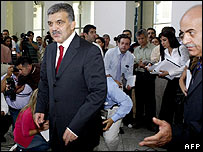
Abdullah Gul has a strong parliamentary base for his bid
|
Turkish Foreign Minister Abdullah Gul has pledged to protect and strengthen the country's secular principles if he succeeds in a fresh presidential bid.
The former Islamist sparked huge controversy and protests in a failed bid for the post earlier this year.
Critics, including the army, feared an erosion of secular values despite Mr Gul's reassurances to the contrary.
Mr Gul's AK Party dominates the Turkish parliament, which chooses the president in a run of votes starting on Monday.
"Protection of secularism is one of my basic principles," Mr Gul told a news conference on Tuesday after submitting his application to parliament.
"Nobody should worry about this."
Mr Gul said Turkey was a "democratic, secular and social state based on the rule of law", and he vowed to protect and strengthen these principles as his first priority.
The BBC's Sarah Rainsford in Istanbul says Mr Gul's comments were a clear attempt to reassure those who see him as a threat to the system.
 |
ABDULLAH GUL
Became MP for Islamist Welfare Party in 1991
Founding member of AKP in 2001
Foreign minister since 2003, steered EU accession talks
|
Mr Gul's previous presidential bid triggered protests in May because of his Islamist roots.
Opponents dislike the fact that his wife wears the Muslim headscarf, which is banned in state institutions.
The failure of the bid led to an early general election, in which Mr Gul's party won a convincing victory.
Parliamentary support
Mr Gul has been meeting opposition party leaders in an attempt to gather support for his fresh bid.
 |
PARTIES IN PARLIAMENT
AKP 341 seats
CHP 99 seats
MHP 70 seats
Kurdish MPs (DTP) 22 seats
Democratic Left Party 13 seats
Independents 4 seats
Total 550 seats
|
One of the main opposition parties, the MHP, has previously said it would not boycott the latest election, a move likely to ensure a quorum of two-thirds of MPs.
Mr Gul's previous bid for the presidency failed because opposition parties boycotted the two votes in April and May.
In the first and second round of voting a candidate must win a two-thirds majority to be elected - 367 votes out of the total of 550 deputies.
But in the third and fourth round only an absolute majority of 276 is required.
The AKP has 341 MPs, so its candidate would be highly likely to win any contest in a third or fourth round.
The largest opposition party, the secular centre-left Republican People's Party (CHP), confirmed after Mr Gul's announcement that it would oppose his candidacy and boycott parliament during the voting process.
The decision will not be enough to halt Mr Gul's progress unless other groups follow suit.
 |
HAVE YOUR SAY
 I believe he will be a good President as the AKP did a lot for the economy and the people of Turkey.
I believe he will be a good President as the AKP did a lot for the economy and the people of Turkey.

Mohammad Javad Malayeri, Tehran
|
CHP leader Deniz Baykal told CNN Turk television earlier this week that Mr Gul was a "conscious member of an ideological circle" who would lead the country in a new direction.
"Turkey would become a country in which the political balances were changing very fast, in which the Middle East identity would become more pronounced," he said.
The job of president is largely ceremonial, but the incumbent has the power to veto legislative bills and government appointments.
The current president, Ahmet Necdet Sezer, often frustrated the government by blocking its initiatives.


~RS~q~RS~~RS~z~RS~35~RS~)
Bookmark with:
What are these?